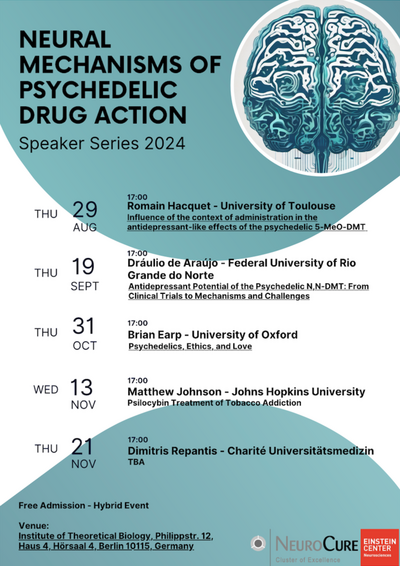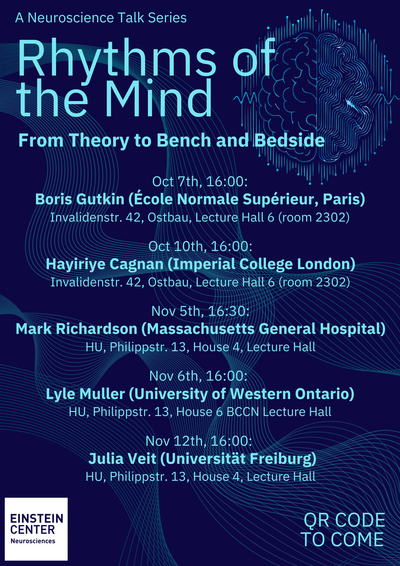The Circuits Club Berlin
"The Circuits Club Berlin" is a series in which invited speakers address topics in systems neuroscience and neighboring fields, such as neuroethology, neuroimaging, and connectomics. The series aims at having vivid discussions with invited speakers, opening doors for future collaborations, and at facilitating scientific exchange among neuroscience labs in Berlin.
Organizers:
Brecht Group: Ben Gerhardt, Lena Kaufmann, & Natalie Gloveli
de Hoz Group: Xing Xiao
Judkewitz Group: Johannes Veith, Leonard Constien, & Verity Cook
Poulet Group: Smriti Sharma
Enlightening Neuroscience: Optogenetics from Green Algae to the Brain
Proteins responsive to light have been a subject of investigation for over a century, yet it is only in the last two decades that they have emerged at the forefront of neuroscience. The ability to stimulate neurons with light has unveiled numerous avenues and applications that allow us to further understand the biological mechanisms behind the greatest scientific enigma of our time - the brain. This series will introduce scientists involved in mining, developing, and utilizing rhodopsins in the realm of optogenetics.
Organizers:
Hegemann Group: Dr. Alina Pushkarev
Larkum Group: Alejandro Gastón Castro Scalise & João Pedro Parreira Rodrigues
Viana da Silva Group: Rina Patel
Neural Mechanisms of Psychedelic Drug Action

The so-called psychedelic renaissance of the last decade has brought psychedelic substances back into the global research spotlight. Psychedelics are under intense investigation for their potential applications in the treatment of depression, anxiety, substance use disorders, obsessive compulsive disorder, eating disorders, and post-traumatic stress disorder. Until today, their mechanisms of action at the molecular, cellular, circuit, and system levels have not been fully clarified, and it remains unclear how these relate to the induced alterations in consciousness functions. Unraveling these mechanisms requires unprecedented international collaboration. This talk series pursues this goal by promoting 1) collaboration among young researchers and helping local students learn about a growing research field, 2) the sharing of data, novel methods, hypotheses, and theories of psychedelic action among leading figures in psychedelic neuroscience research.
Organizers:
CCNB/FU Berlin: Kasey Devitt
Gold Group: Jelena Brasanac
Larkum Group: Anna Bronec, Debapratim Jana, & Sarah Duverdin
Ott Group: Eric Lonergan
Psychedelic Substance Research Group: Chiara Caporuscio & Dr. Timo Torsten Schmidt
Rethinking Synapses: Aspects of Synaptic Complexity and Diversity
What is the purpose of synaptic diversity in the brain? Studies propose that an increased heterogeneity of synapses correlates with a more complex network processing and
enhanced behavioral-relevant activity patterns. Understanding the different levels of synaptic diversity is key to identifying novel mechanisms of synaptic transmission in addition to gaining insight into brain function in health and disease. This seminar series is therefore dedicated to labs focusing on understanding fundamental synaptic properties and their relation to brain function and behavior.
Organizers:
Ewers Group: Bas van Bommel
Rosenmund Lab: Astghik Abrahamyan, Judit Ozsvar, Malgorzata Lubas, & Melissa Herman
Lipstein Group: Dragana Ilic & Sun Siqi
Mikhaylova Group: Julia Bär
Milovanovic Group: Akshita Chhabra
Rhythms of the Mind - From Theory to Bench and Bedside

Both in wakefulness and sleep, the human and animal brain engages in various types of oscillations that serve multiple roles and functions. Many of those oscillations underlie cognitive processes and are altered in clinical disorders, such as movement and psychiatric. Oscillation research employs a broad range of recording methods resulting in theoretical frameworks that can be tested with computational models. This allows the investigation not only of the function and underlying mechanism of a certain rhythm but also its propagation and interaction with others. A close dialogue between theory and experiments is also needed to develop new stimulation paradigms in order to manipulate the oscillations, enabling new forms of clinical treatment. This series will introduce speakers who focus on different types of oscillations, covering a wide selection of approaches, from theoretical to bioengineering applications.
Organizers:
Aguiar Lab, i3S University of Porto: Andreia M. Oliveira
Kempter Group: Stefano Masserini
Neumann Group: Maria Mikhailenko
Obermayer Group: Ronja Strömsdörfer
Spitzer Group: Ines Pont-Sanchis


